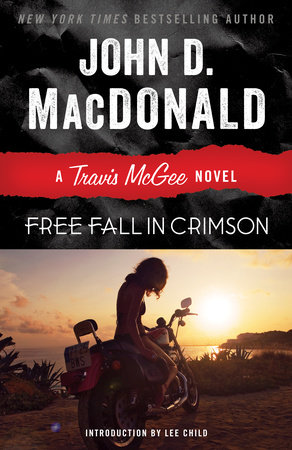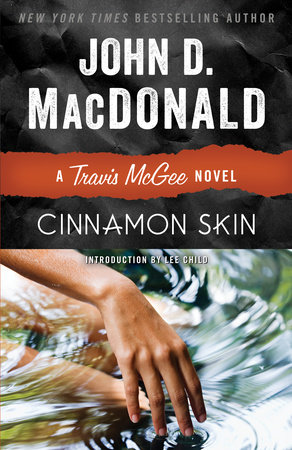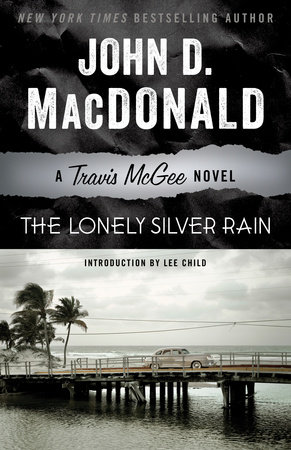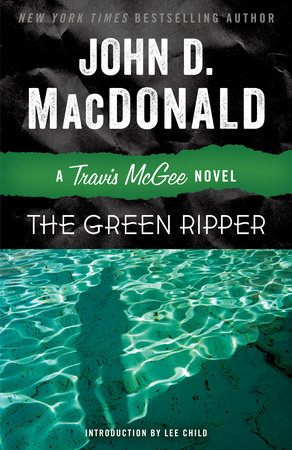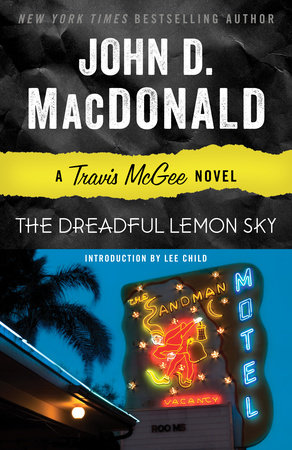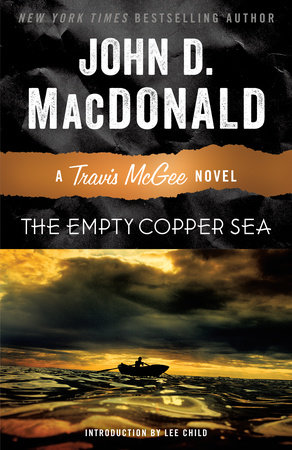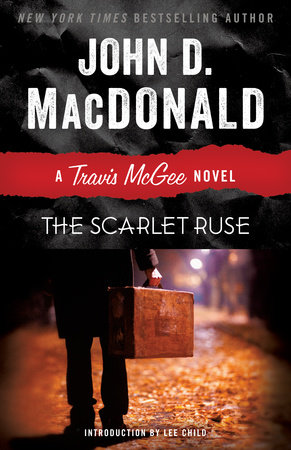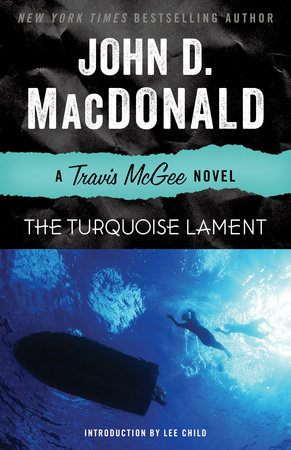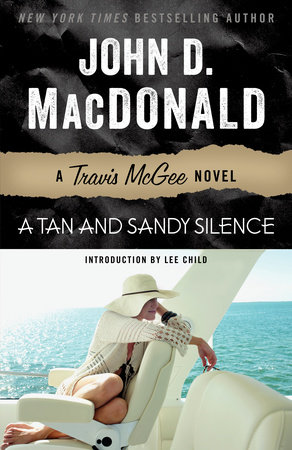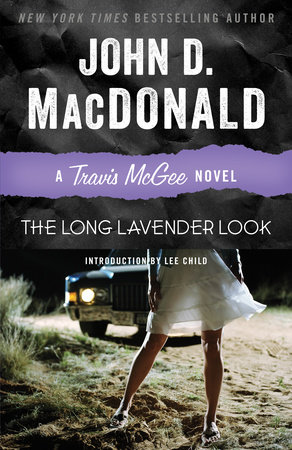Excerpt
Free Fall in Crimson
One
We talked past midnight, sat in the deck chairs on the sun deck of the Busted Flush with the starry April sky overhead, talked quietly, and listened to the night. Creak and sigh of hulls, slap of small waves against pilings, muted motor noises of the fans and generators and pumps aboard the work boats and the play toys.
“I don’t really know how the law works,” Ron Esterland said. “But I would think that if you arranged someone’s death, even if he were dying already, you shouldn’t inherit.”
“Where do you come in?” Meyer asked.
Esterland took a long time answering. “All right. If some money came to me, I wouldn’t turn it down. Maybe to that extent I’ve grown up a little. But I can get along without it. Years ago I would have turned down anything my father wanted to give me or leave me. If, Travis, as a result of your efforts, anything does come to me, the deal is that you get half. But the chance is so remote, I pay expenses.”
I got up and stretched, went to the rail, and did some push-offs against it and some deep knee bends. The night was chilly for April, and after my heavy morning workout, sitting so long had made me stiffen up.
I turned and asked Ron to straighten out the chronology of the Esterland wives for me. “I guess it is confusing,” he said. “My mother, Connie, was wife number one. She died when I was eleven. Dad married Judy Prisco when I was twelve. She was a dancer. They had no children. They were divorced in six months. It was quick and ugly, and she accepted a sizable settlement. When I was thirteen he married Josephine Laurant, the actress. She and I got along well. I was sent away to school when I was sixteen. Romola, their daughter, was almost three then. I never really went home again. There were some big scenes. My father didn’t like to be crossed by anybody, for any reason. He and Josie got a legal separation after ten years of marriage. Romola was nine. A nice little kid. Josie went out to the West Coast to live. It was what they called a friendly separation.”
“When did they find out your father had cancer?” I asked.
“A little over three years ago. He spent the first few months liquidating his holdings. That is, when he got out of the hospital after the exploratory, and when the radiology and the chemotherapy didn’t leave him too debilitated. Then he began to feel better. He had a remission. That’s when he moved down here to Fort Lauderdale and bought the motor sailer and moved aboard with the woman who had been working for him for several years. Anne Renzetti. As part of putting his affairs in order, he made a new will. As I remember, his previous one left me ten dollars. So he could mention my name, I guess. The new will set up some bequests for Josie and Anne and left the bulk of the estate to Romola. Then there was a paragraph about what should happen if Romola predeceased him, which nobody really expected her to do at that time. If that happened, then the money she would have gotten would go to the setting up of an Esterland Foundation, to make grants for research into neutralizing dangerous chemical wastes before disposal by industry. He thought that’s where he got his cancer, from working with plastics and reagents, chemicals of all kinds. That portion of the will, that contingency portion, left me a hundred thousand dollars. Which of course I didn’t get. But it was nice to know my stock had risen that much in his estimation.”
“And then Romola had her accident?” Meyer asked.
“Yes. Two years ago next month. May tenth. There was a severe skull fracture, and she never came out of the anesthetic. She was plugged into a life-support system. The brain waves were increasingly flat. Josie kept trying to believe there was hope. She died finally on August tenth. She had turned twenty. But by then my father was dead. He was beaten to death near Citrus City on the twenty-fourth of July. So Romola was his heir.”
“How much did the girl inherit?” Meyer asked.
“Three and a half million after taxes, but then of course when Josie inherited from Romola, the government took a large slice. A little more than a million dollars.”
I went back and sat down. Ronald Esterland sighed audibly. He was a blond man, going bald at thirty-four, with big hands and thick shoulders, a bland face, a good smile.
“I think what is bothering me,” Meyer said, “and Travis too, is why you waited a year and a half to look into this whole thing.”
“I can’t give a good answer to that. I’m sorry. I was in London, and I had a chance to exhibit in the Sloane Gallery. I had enough work on hand for about half the space they were ready to let me have. And it was a chance to work in some bigger pieces. I kept telling myself I didn’t care what had happened to my father. He was a brutal man. He said brutal things. He tried to destroy the people around him. And somebody had the good judgment to beat him to death. I worked like hell, and I filled the good spaces in that gallery. The show was a success. The reviews were better than any of my group expected. Eight paintings were sold at the opening, and by the end of the first week there were only four left unsold, and three of those were huge. I went back one afternoon. Very few people there. I roamed the show, seeing all the little red stars they stuck on the paintings to indicate they were sold. I had a feeling of pride and satisfaction, but at the same time I felt a kind of desolation. A kind of bleakness. I realized then that my father had been dead a year and I hadn’t really understood what it meant to me. A lot of my motivation had been to show him that I had value, that I was valued by the world, and so I was worthy of his love and his respect. He had never shown me love or respect. I know how deeply I had wanted those things. I had wanted to make him come around. And I couldn’t. He was gone. He had somehow escaped, and I felt frustrated. When the show came down, I closed the studio and moved back to New York. Back home. I found that I could work, after a fashion, but not as well as I wanted to work. I kept thinking about my father and Romola and the ugly fact of the murder of a dying man. So I came down here because this is where he had lived, aboard his boat, for the months before he died. That’s how come I ran into Sarah Issom. I hadn’t seen her for years, since I lived in Greenwich Village. She’s doing damned fine work, and she said you bought one of her paintings.”
“A little seascape. An aerial view. Lots of blue in it. I am a junky for blue.”
“She has a lot of skill. She told me you did a favor for her a few years ago, and you might be the one to do a favor for me.”
“I’m not a private detective.”
“You said that before. I know.”
“I have no official standing. I don’t want to get into anything where I attract too much attention from the law, because I have no status. They don’t like people meddling. They don’t like amateurs.”
“I’ve put ten thousand dollars aside for expenses.”
“I want to think about it,” I told him. “I’ll be in touch one way or the other.”
So we shook hands around and he went down the ladderway and back to the stern and down the little gangway to the dock. I heard his heels on the cement as I watched him walk off, passing under the dock lights, his long shadow moving and changing with each light.
I went back and sat by Meyer.
“So?” he said.
“So. So I know now that I can’t make it doing odd jobs here and there, and if I want to make it, I will have to seek honest work, like in Rob Brown’s Boat Yard. Or with Acme Diving and Salvage. Or working for a yacht broker. Travis McGee, your friendly boat salesman. With a salary, bonuses, and a retirement plan.”
“And,” said Meyer, “on your days off you can sit around here on the houseboat and whine and whinny about how jaded life has become.”
I stared over at him in the darkness. “I have been doing that quite a lot, haven’t I?”
“Not more than I can stand. But enough.”
“What can I tell you? I swam for three hours yesterday, some of it as hard as I could go. I woke up this morning feeling great. Absolutely great. Busting with energy. Know something? I want to get involved in the life and times of Esterland and son. I want to go out and con the people. I want to have to bust a couple of heads here and there and have somebody try to bust mine for me. Why should I feel a little bit guilty about feeling like that, Meyer?”
“Maybe you got so you were enjoying the ennui.”
“The what?”
“Ennui, you illiterate. That is the restless need for some kind of action without having the outlet for any action at all. It is like weltschmerz.”
“Which, as you have so often told me, is homesickness for a place you have never seen. I miss Gretel, Meyer. God, how I miss her! But she is dead and gone, and the stars are bright and the night wind blows, and the universe is slowly unfolding, revealing its wonders. What was your impression of Ellis Esterland?”
“I did spend a couple of evenings with him. And Miss Renzetti. Not actually out of choice. He wanted to pick my brain, and I his. He wanted to know some of the banking practices in Grand Cayman, and I wanted to know which plastics companies were going to lead the pack in the future, based on new discoveries. What was he like? He tried to give the impression of being bluff and hearty and homespun. But he was a shrewd and subtle man. A good watcher. A good listener. I had no idea he was as sick as they say he was because that had to be--let me think back--two years ago in May, two months before he died.”
“What happened to his lady? Do you know?”
“Anne Renzetti? She stood up to him pretty well. I think he had a habit of bullying his women. I heard that she’s over in Naples, Florida, working in a resort hotel. Mmmm. Eden Beach! Correct.”
“She was in the will?”
“I don’t know, but I would think she was. She had been an employee. When he sold out his plastics company years ago, he set himself up as a management consultant, specializing in chemical and plastics companies, and from what he said I think he must have had a staff of a dozen or so. The offices were in Stamford, Connecticut. When he got sick he sold out and kept the Renzetti woman as a private secretary to help him put his affairs in order. After he was killed, the executor let her live aboard the boat until it was sold.”
I went back to the rail, snuffed the night. No traffic sounds. No surf sounds. Fifty boats away a night woman gave a maniacal cry of laughter, as abrupt and meaningless as the honk of a night-flying bird. I did not trust the rising sense of anticipation I felt. I had tried to fit myself to somberness, to a life of reserve. I had located a couple of boats for people, for a finder’s fee. I had ferried a couple of big ones--a Hatteras over to Mobile, a Pacemaker up to Maryland--and flown back. I’d done some work for one of the brokers, putting bargain boats through their paces for people who wanted to believe how easy it was before making the down payment.
I told myself I had lived in a house of many rooms, but there had been a fire, and it was all charred to hell except for a small attic bedroom. A bed, a chair, a table, and a window. And if anybody wanted to take a shot, I would happily stand in the window.
But you can’t cut your life back like some kind of ornamental shrub. I couldn’t put the old white horse out to pasture, hock the tin armor, stand the lance in a corner of the barn. For a little while, yes. For the healing time.
It was more than economics. I could tell myself I needed the money. And I did. More than the money, I needed the sense of being myself, full size, undwarfed by my disasters.
I turned to Meyer and said, “I think I could find something where the chance of some kind of recovery would be better.”
“Maybe.”
“Ron Esterland is a little paranoid about the whole situation. He’s got a hang‑up about his father. He isn’t thinking clearly.”
“Probably he isn’t.”
“I don’t see what Anne Renzetti would be able to tell me that would be any help at all.”
“Neither do I.”
“Want to ride over to Naples with me?”
“I would enjoy that. Yes.”
“Thanks for talking me into it, Meyer.”
“For a little while I didn’t think I could do it.”
Two
Meyer waited in my old blue Rolls pickup while I talked money and time with Ron Esterland. Then in midmorning on a fine April Saturday, I drove over to Alligator Alley and we went humming westward past the wetlands, the scrub palmetto, the dwarf cypress. Traffic was heavy. Each year the gringos stay down longer. Each year too many of them come down to stay forever. Once the entire state becomes asphalt, high rises, malls, highway, fast food, and littered beaches, they will probably still keep coming.
The computer in one of the basements inside Meyer’s skull predicts an eventual Florida population of thirty-two million folk, and by that time it will level off because it will not be any more desirable to live in Florida than it is to live in Rhode Island or West Virginia.
“What can you remember about Ellis Esterland’s murder?” I asked Meyer. He walked back into his computer room and checked out the right floppy disc and played it back for me.
“On a very hot day Esterland drove up to Citrus City, in River County. That is about a hundred and twenty miles from Fort Lauderdale. Miss Renzetti offered to drive him, but he said he would go alone. She said he was feeling much better that month, even though he was depressed by his daughter’s condition. He did not tell Miss Renzetti why he was going to Citrus City. And nobody ever found out. He was driving a dark gray Lincoln Continental. He had lunch alone at the Palmer Hotel, in the center of the city, and sat in the lobby for a time reading the Wall Street Journal. No one noticed his departure. Apparently he drove his car back over to the Florida Turnpike and stopped at a rest area six miles south of the interchange for Citrus City. A trucker found the body and reported it on CB radio. He was face down on the floor in front of the rear seat with his legs doubled under him. His wallet was on the front seat. His money was gone. Miss Renzetti said he probably had about two hundred dollars with him. He had been severely beaten. Blood beside the car and spattered against it indicated that he had probably been tossed into the back after the beating. Skull fractures, jaw fracture, broken facial bones, broken ribs. Nobody saw anything. No witness ever came forth. There were no clues.”


